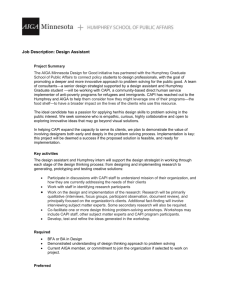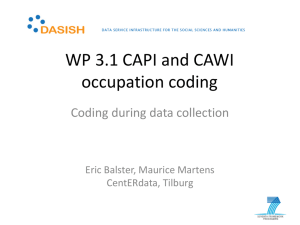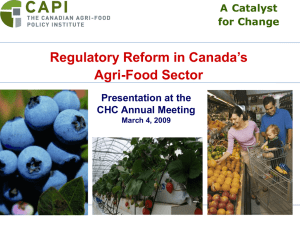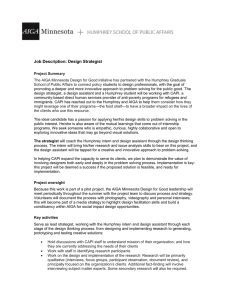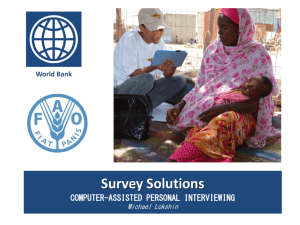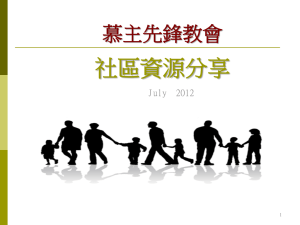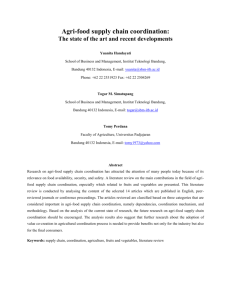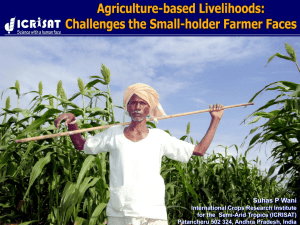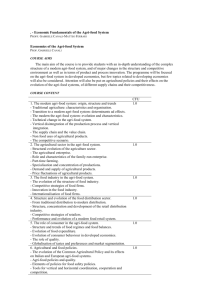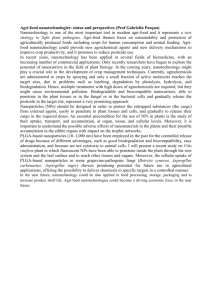2007-08 Annual Report A catalyst for change
advertisement
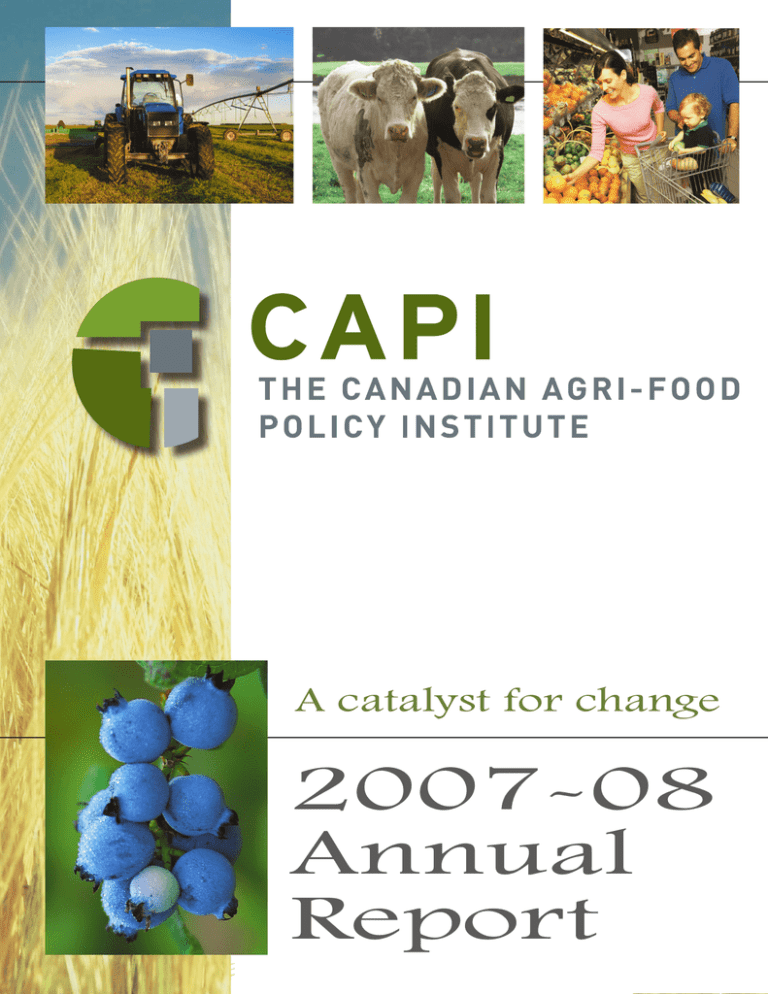
page 1 A catalyst for change 2007-08 Annual Report Annual Report 2007-08 page 2 Toward a healthy, sustainable and competitive agri-food sector © copyright 2008 Canadian Agri-Food Policy Institute 960 Carling Avenue, CEF Building 49, Room 318 Ottawa, ON K1A 0C6 T: 613-232-8008 F: 613-232-3838 info@capi-icpa.ca www.capi-icpa.ca Annual Report 2007-08 page 3 Vision/Mission The Canadian Agri-Food Policy Institute (CAPI) is an independent organization dedicated to the long-term health and success of Canada’s agri-food sector. CAPI identifies emerging issues and trends that influence agriculture and merit analyses. It brings together industry leaders to provide their views, and fosters debate on topics of interest to all parties throughout the value chain. CAPI works to keep Canada’s agri-food sector at the leading edge of the global marketplace. CAPI was created to fill a void in agricultural policy development in Canada, providing a third voice on the critical issues facing industry and government. Since government policymaking often focuses on short-and medium-term challenges, CAPI focuses on long-term issues. It provides a rigorous forum for discussion, and when required acts as a catalyst for change. CAPI draws links between health, the environment, and the agri-food sector. The Institute aims to provide new ideas to primary producers, food manufacturers, retailers, academia, industry, and government. The Institute is committed to helping the agri-food sector proactively address the challenges of the next five- to 10-year period. CAPI envisages a healthy, sustainable and competitive Canadian agri-food sector. Annual Report 2007-08 page 4 Letter from the chair The Canadian Agri-Food Policy Institute came of age in 2007-08. The fiscal year began on the heels of a watershed moment in the Institute’s history. On January 23, 2007, Agriculture and Agri-Food Canada pledged $15 million in support for CAPI over 15 years. This funding has allowed the Institute to begin functioning as a permanent think tank. I would like to express my appreciation to the Honourable Gerry Ritz, Minister of Agriculture and Agri-Food Canada. In view of globalization, Canada’s agri-food sector will need to reinvent itself in order to compete and prosper in the future. I foresee CAPI making a significant contribution to this renewal. In 2007-08, CAPI was able to take on several exciting new projects. It also initiated a new look, with a revamped corporate brand and website. 2007-08 also saw significant administrative changes. Effective January 21, 2008, Ms. Kathleen Sullivan became the new president of CAPI. Ms. Sullivan succeeded Mr. Yvan Jacques, who had served as president since CAPI was established in February of 2004. During his tenure, Mr. Jacques showed great leadership, dedication and commitment to the Institute. Ms. Sullivan has embraced her new role, launching new projects and modernizing the Institute’s overall administrative structure. CAPI is well positioned to make a significant, ongoing contribution as a “third voice” on policy issues affecting Canada’s agri-food sector. The future holds great promise. Sincerely, Gaëtan Lussier Chairman Annual Report 2007-08 page 5 Letter from the president In Canada, the agri-food sector faces increasingly complex policy issues. Globalization, consumer issues, food safety and security, the environment, rising energy costs, economic variables, and infrastructure are just some of the evolving factors affecting agriculture today. As CAPI’s new president, I am honoured for the opportunity to tackle the myriad of issues impacting the industry. Since 2004, CAPI has achieved several milestones that will bolster our ability to take on complex projects. With our new, long-term funding, we initiated a corporate reorganization, and completed a new branding exercise to make CAPI more recognizable and accessible. In 2007-08, CAPI undertook major new projects in our three key thematic areas: health, sustainability, and competitiveness. We launched an investigation of the connections between health and food, held a symposium on ways to rejuvenate local economies, and undertook a study on farm income. CAPI is now a permanent think tank. Backed by a strong record of achievement, CAPI is committed to proactively addressing the challenges faced by the Canadian agri-food sector. Our objective is to help ensure that Canada has a healthy, sustainable, and competitive agri-food sector. Sincerely, Kathleen Sullivan President Annual Report 2007-08 page 6 History The Canadian Agri-Food Policy Institute was created in 2004 by the minister of Agriculture and Agri-Food Canada. CAPI was formed as a non-profit corporation that would operate at arm’s length from government. CAPI was mandated to provide analysis and foster debate on issues of interest to all parts of the agri-food value chain. CAPI’s tasks have included: hosting conferences and workshops, commissioning research projects, publishing papers, and fostering better communication and information sharing between researchers and policymakers. In all of its work, CAPI was expected to take a longer term view, by contrast to the shorter term pressures that confront governments and industry. Governance CAPI’s leadership and governance is provided by a seven-member Board of Directors. The Board includes: Gaëtan Lussier (Chair), Bob Church, Garth Coffin, George Fleischmann, Ken Knox, Owen McAuley, and Doug Stewart. The Board appoints an Advisory Committee to provide input, direction and guidance to support the development of work plans and ongoing research efforts. The federal and provincial departments of agriculture and food support the work of CAPI and seek CAPI’s input on policy issues. Membership CAPI grants memberships to organizations and individuals interested in supporting the Institute’s objectives. Individuals or organizations that make a one-time donation of a minimum of $100,000 receive voting rights. Associate members include individuals who pay an annual membership of $250 or organizations that pay an annual membership of $10,000. Annual Report 2007-08 page 7 Approach CAPI spans the Canadian agri-food landscape. The Institute takes a multidisciplinary and collaborative approach. CAPI consults with a variety of stakeholders to identify important areas of activity, and assembles core work teams of subject matter experts to work on each project. CAPI’s objective is to bring together the best and brightest minds to tackle issues of relevance to the agri-food sector. CAPI provides a framework for the development of future agricultural policy options by: • • • • Commissioning studies; Convening expert panels to review and critique these studies; Conducting sessions for stakeholders to provide their views; Distributing the results of its work to agri-food industry associations, businesses, farm organizations, governments, other national and international bodies, and academic institutions. CAPI works with a broad range of organizations to collaborate on research, identify best practices, and support other ongoing initiatives with policymaking implications. CAPI is interested in working with the provinces, territories, and the private sector. Annual Report 2007-08 page 8 Health HEALTH AND FOOD PROJECT In 2007-08, CAPI launched a new initiative to look at the relationship between health and food. This relationship is becoming increasingly apparent as major health concerns become more prominent in Canada, including obesity, diabetes, and cardiovascular diseases. Although nutritionists recommend a balanced diet that includes fresh fruit, vegetables, grains and meat, people often opt for foods heavy in salt, sugar, and fats. CAPI retained a project team of experts to research examples of integrated health and food initiatives around the world. The team published its findings in a report called Finding Common Ground: Food for a Healthy Population and a Healthy Agri-Food Sector. The team concluded that an integrated strategy requires five elements: • Strategic collaboration • Research and innovation • A regulatory and economic framework • Population health and education • Monitoring and evaluation Finding Common Ground Food for a Healthy Population and a Healthy Agri-food Sector A Synthesis Report In 2008-09, CAPI is developing a framing paper to lead the way – or provide a roadmap – toward an integrated health and agri-food strategy for Canada. Annual Report 2007-08 page 9 Sustainability RURAL RENAISSANCE PROJECT In 2007-08, CAPI undertook a project to encourage a renaissance in rural economies in Canada, both in the agri-food sector and other areas. The project was called Growing Canada’s Rural Economies. The centerpiece was a oneday symposium that CAPI hosted in Winnipeg to consult with experts on avenues to stimulate a rural renaissance. Growing Canada’s Rural Economies: Toward an economic renaissance in agri-food and other sectors Proceedings Report Based on the symposium, CAPI has identified A one-day symposium hosted by the Canadian Agri-Food Policy Institute (CAPI) several major themes for incorporation into a final Hilton Suites Winnipeg Airport Winnipeg, Manitoba | February 28, 2008 report: • Diversification: As agriculture plays a less significant role in rural economies, local Canadian Agri-Food Policy Institute (CAPI) 960 Carling Avenue, CEF Building 49, Room 318 Ottawa, ON K1A 0C6 T: 613-232-8008 F: 613-232-3838 info@capi-icpa.ca www.capi-icpa.ca Contact: Manon Bougie communities must diversify; • Community support: Government support needs to shift from a sector-based approach that favors traditional agriculture to one based on the unique geography of each region; • Infrastructure: For value-added activities to occur, rural communities need the appropriate infrastructure, particularly in transportation and broadband Internet; • Entrepreneurship: Entrepreneurship must be encouraged. This means relaxing regulations for small businesses, and it means training and skills-development; • Research: Research is needed in many areas, such as research on whether the “cluster” approach to economic development should be encouraged; • Environment: Rural communities need to consider environmental impacts, and to develop sustainable technologies and living patterns. As well, we should see sustainability as an economic opportunity. Annual Report 2007-08 Manon@capi-icpa.ca page 10 Competitiveness FARM INCOME PROJECT In 2007-08, CAPI launched a project on the financial performance of farm businesses in Canada. CAPI prepared a major background report on this topic in preparation for a series of consultations to be held with stakeholders the subsequent year. The objective of the Farm Income Project was to determine which performance measures the government should develop and publish on a regular basis to provide an indication of the relative financial position of farmers. Traditionally, farm income has been assessed in aggregate measures based on a top-down estimate. But recently, Statistics Canada and Agriculture and Agri-Food Canada have begun providing farm income information on a disaggregate basis. For example, farm income information is now available based on farm type. REGULATORY REVIEW CAPI is undertaking a review of the regulatory framework in Canada and among its competitors. The purpose is to help the government implement regulatory flexibility and reforms, and provide input that results in a more flexible regulatory system which: protects consumers; enhances competitiveness; fosters innovation; and contributes to sustainability. Annual Report 2007-08 page 11 Finances AUDITOR’S REPORT To the Directors of the Canadian Agri-Food Policy Institute The accompanying summarized balance sheet and summarized statement of revenue and expenses and changes in net assets are derived from the complete financial statements of the Canadian Agri-Food Policy Institute (the “Institute”) as at March 31, 2008, and for the year then ended on which we expressed an opinion without reservation in our report dated May 23, 2008. The fair summarization of the complete financial statements is the responsibility of management. Our responsibility, in accordance with the applicable Assurance Guideline of the Canadian Institute of Chartered Accountants, is to report on the summarized financial statements. In our opinion, the accompanying financial statements fairly summarize, in all material respects, the related complete financial statements in accordance with the criteria described in the Guideline referred to above. These summarized financial statements do not contain all the disclosures required by Canadian generally accepted accounting principles. Readers are cautioned that these statements may not be appropriate for their purposes. For more information on the Institute’s financial position, results of operations and cash flows, reference should be made to the related complete financial statements. Chartered Accountants Licensed Public Accountants Ottawa, Canada May 23, 2008 Annual Report 2007-08 page 12 Finances BALANCE SHEET at March 31, 2008 2008 ASSETS Cash and cash equivalents $709,237 Accounts receivable 47,699 Prepaid expenses - Capital assets 5,455 Long-term investments 14,734,169 Contributions receivable - LIABILITIES Accounts payable and accrued liabilities Deferred contributions Long-term deferred contributions Net assets $15,496,560 2007 $657,280 103,696 2,750 15,000,000 $15,763,726 $82,788 662,120 14,739,624 $32,693 731,033 15,000,000 15,484,532 15,763,726 12,028 $15,496,560 $15,763,726 Statement of Revenue and Expenses and Changes in Net Assets year ended March 31, 2008 REVENUE Grant contributions Project related contributions Initial contributions ACAFF (Health and agri-food) Other contributions (health and agri-food) Interest income Other income Expenses Administration Research Activities Networking Projects Program activities Health and Agri-Food Project CAPI Vision Project CAPI projects Excess of revenue over expenses Net assets, beginning of year Net assets, end of year 2008 $936,853 55,913 264,992 18,000 12,028 - 2007 $ - 572,850 103,819 10,000 35,463 1,384 1,287,786 723,516 256,551 383,463 207,006 485,424 142,314 - 325,705 - 1,072 1,275,758 105,344 92,395 723,516 12,028 - $12,028 Annual Report 2007-08 $ -
